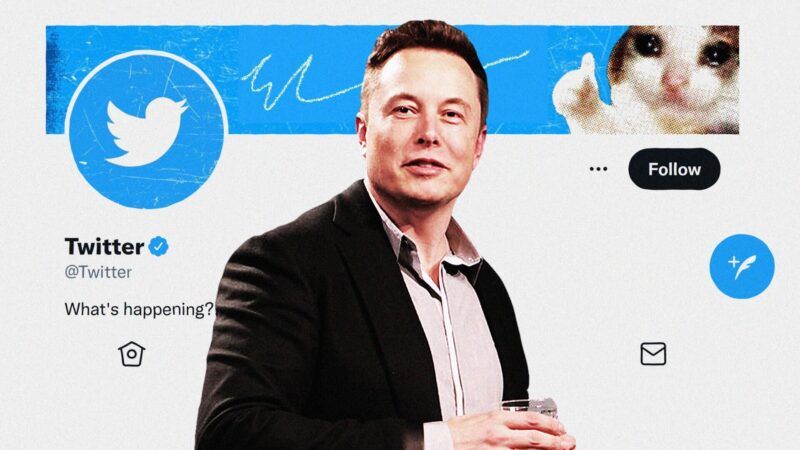Elon Musk Buys Twitter, Twitter's Biggest Egos Melt Down
The SpaceX/Tesla founder and billionaire has articulated lofty free speech ideals. Can he make them reality?

Over the last week, SpaceX and Tesla founder Elon Musk arranged $46.5 billion in financing to follow through on his unsolicited offer to Twitter's board to buy the social media site from them. This afternoon, the board accepted Musk's offer to buy the company for $54.20 a share.
Long a Twitter power user/troll/loudmouth, Musk bought a 9.2 percent stake in the company last month, becoming the largest shareholder, before deciding he'd rather have the whole thing.
Cue hysteria! Musk haters have taken to the site to declare that Donald Trump will now probably win the 2024 election, that Musk's bid is really about white power, that Section 230 must be reformed, and that, yes, Musk's new policies will be lethal. (Perhaps the death toll will be even larger than net neutrality's!)
So, for users of the platform, what's likely to change?
Musk has panned the site's existing content moderation policies, saying they are too restrictive and encroach on people's ability to speak freely without being censored. Some liberalization of these policies and the re-platforming of controversial figures like former President Donald Trump—who was banned in the wake of the January 6 riot for inciting violence among his fans—seems likely, though unpopular with droves of users.
At the mid-April TED conference in Vancouver, Musk talked about his interest in making Twitter's algorithm open-source. The Diff's Byrne Hobart took this a step further, outlining how "Twitter should monetize a protocol rather than run an app," and explaining the tension between Twitter as a consumer product and as "a way for individual users to update a universal shared database, which can then be filtered based on who's interested in what." Hobart claims that it's possible that Twitter has been "radically miss-monetized," and that Musk could potentially realign its priorities. However, little of the online discourse has focused on the technical possibilities.
The new Twitter owner has, through coy tweets, hinted that his new policies will not be applied arbitrarily and that consistent application will mean some number of right-wing users currently cheering his new ownership will surely be disappointed:
I hope that even my worst critics remain on Twitter, because that is what free speech means
— Elon Musk (@elonmusk) April 25, 2022
A social media platform's policies are good if the most extreme 10% on left and right are equally unhappy
— Elon Musk (@elonmusk) April 19, 2022
Elsewhere, Musk has said that Twitter is a "town square" or "public square," and that banning people from using the platform effectively prevents them from participating in the important discussions of the day.
Though people who care about fostering a culture of free speech may agree with the tenor of Musk's comments, the analogy is a terrible one. For most of America, the public square is the school board meeting and the town council meeting. There are also numerous other privates spaces for civic engagement: the church pulpit and the post-sermon fray it inspires; neighborhood listservs and the cesspool that is NextDoor; or maybe it's Facebook, in-person conversations, and email lists. For many millions of Americans, Twitter is not integral to hashing out values, concerns, and disagreements. Think of the implications if we expected the government to treat such companies—which have their own terms of service and standards that they are free to decide and we are free to consent to—as something akin to public utilities.
If anything, the new owner of a social media company should convey an inflated sense of the platform's worth! But Musk has at times, despite his forceful defense of free speech culture on the internet, repeated confused talking points that indicate scattered thinking while simultaneously failing to fully flesh out what day-to-day operations will look like. For example, a lot of content moderation involves the unsexy—and not very ideological—challenge of keeping spam under control. And, as Mike Masnick points out at Techdirt, Musk doesn't seem to have a particularly robust understanding of "hate speech" and how much of what we call hate speech is, in fact, protected by the First Amendment.
A lot remains to be seen about how Twitter will change and what Musk will bring to the table. Optimism, with some reservations about Musk's ability to execute, seems warranted. Hysteria—like declaring that it's now open season for white supremacists, that Musk's vision for free speech will be "lethal," or that Musk is an echo of imperialist, colonizer forebears because he wants to go to Mars—is not.


Show Comments (242)